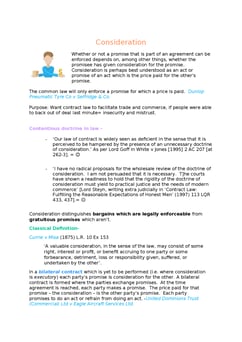Combe v Combe [1951] 2 KB 215
Judgement for the case Combe v Combe
Table Of Contents
KEY POINTS
Promissory estoppel serves the purpose of preventing individuals from invoking their strict legal entitlements or reneging on promises. It does not independently constitute a basis for legal action.
Promissory estoppel is “a shield, not a sword.” (Denning LJ)
FACTS
Mr. Combe made a promise to Mrs. Combe that he would provide her with an annual maintenance payment in the sum of £100 annually. However, their marriage faced difficulties and eventually led to divorce.
After the divorce, Mr. Combe refused to honour the promise of providing maintenance to Mrs. Combe.
Seven years after the divorce, Mrs. Combe initiated legal action against Mr. Combe in an attempt to enforce the promise he had made regarding the annual maintenance payments.
Mrs. Combe's legal argument centred around the doctrine of promissory estoppel. She contended that although there was no formal contract due to the absence of consideration, she had relied on Mr. Combe's promise to her own detriment.
This reliance had led her to take actions or make decisions that she would not have otherwise taken, assuming that Mr. Combe would fulfil his promise of providing maintenance.
JUDGEMENT
The court ruled in favour of Mr. Combe. Promissory estoppel is not applicable in this case.
COMMENTARY
This case remains a significant landmark in the development of promissory estoppel.
It illustrates the court's acknowledgment of the principle's importance in safeguarding parties' reasonable reliance on promises, thereby serving as a reminder of the evolving nature of contract law in response to changing societal and equitable considerations.
ORIGINAL ANALYSIS
A man promised to pay his wife £100 a year after their divorce. Relying on this, she didn’t apply for maintenance.
The CA said it was an unenforceable agreement, since he, the promisor, had not asked her to do it.
Denning LJ
Asserted that promissory estoppel can only be used to prevent someone from relying on their strict legal rights of going back on a promise. It is NOT a cause of action itself.
LJ Birkett supported this, describing promissory estoppel as a “shield, not a sword).
Denning LJ also said that promissory estoppel only applies to modifications of a contract, whereas contract formation itself still requires consideration. The doctrine of equitable estoppel gives no new rights. Denning said this was to prevent it clashing from the general requirement of consideration for establishing new contracts/new rights.
For Further Study on Combe v Combe

A collection of the best GDL notes the director of Oxbridge Notes (an O...
Need instant answers? Our AI exam tutor is here to help.
Ask questions 🙋 Get answers 📔 It's simple 👁️👄👁️
Our AI is educated by the highest scoring students across all subjects and schools. Join hundreds of your peers today.
Get StartedRelated Product Samples
These product samples contain the same concepts we cover in this case.
| Contract Law | Promissory Estoppel Notes (6 pages) |
| GDL Land Law | Proprietary Estoppel Notes (7 pages) |


 Since 2010, Oxbridge Notes has been a trusted education marketplace, supplying high-quality materials from top achievers at universities like Oxford, Cambridge, LSE, Harvard, and Yale.
Since 2010, Oxbridge Notes has been a trusted education marketplace, supplying high-quality materials from top achievers at universities like Oxford, Cambridge, LSE, Harvard, and Yale.